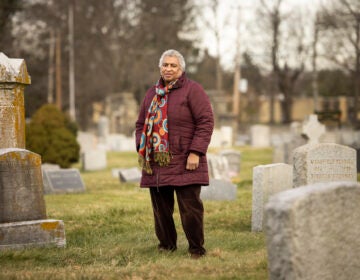Philly celebrates Octavius Catto and Transit Equity Day
To mark Transit Equity Day, Philadelphians remembered Octavius Catto and his push to integrate city streetcars in 1867. They also gathered ideas for making today’s SEPTA more

Cake was served at the Philly Transit Equity Day event in Center City to honor the 180th birthday of Octavius Catto. (Darryl Murphy/WHYY)
Feb. 22 marked the 180th birthday of civil rights hero Octavius Catto, who helped desegregate Philadelphia’s streetcar system in 1867.
More than 150 years after the integration, a coalition of state and local organizations continuing the fight honored his legacy over the weekend in Center City with Philly Transit Equity Day.
“The issues that we’ve been talking about in the 1860s are still the issues that we’re talking about today,” said Zakia Elliott, coordinator of the Philadelphia Climate Works coalition and the lead organizer of the event. “Who is able to ride our trolley system, our transit system in general. Is it fair? What needs to change? How loud do we have to be to make it happen?”
Attendees and guest speakers shared ideas for making Philadelphia’s public transportation more equitable for all residents, which is also an environmental issue, Elliott said.
“One of the most important things that Transit Equity Day is trying to elevate is how public transportation can help to combat climate change,” she said. “But it does require us to plan our transportation in a way so that we are reducing the emissions that come from our transportation.”
Advocates say SEPTA can improve equity with electric buses; clean, functioning elevators at every station; and more affordable fares. SEPTA currently has many hybrid diesel-electric buses; with a grant it got last summer, it now has plans to roll out 35 all-electric ones.
Tony Brooks, a member of the ADAPT advocacy group for those with disabilities, said he has been making the rounds at SEPTA meetings to call for more accessible stations.
“Transportation is one of the aspects of our lives to be independent and be able to go out and enjoy life like everybody else,” Brooks said.
The coalition gathered feedback about the transit system from attendees at the weekend event and plans to survey riders at major transit stops, Elliott said.
They plan to compile the information along with input from coalition members such as 350 Philadelphia, Philadelphia Unemployment Project, and People’s Emergency Center to create a policy platform for transit equity.
“We need to pay attention to those ideas that people are putting forth,” Elliott said. “The struggles that they’re facing, because public transportation is supposed to be for everyone. And it’s not supposed to be something where someone is struggling to use it.”
WHYY is your source for fact-based, in-depth journalism and information. As a nonprofit organization, we rely on financial support from readers like you. Please give today.





